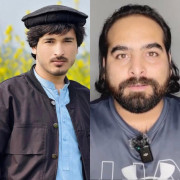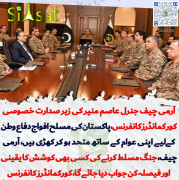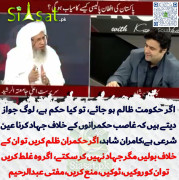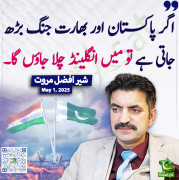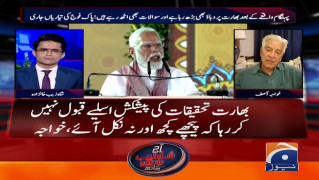An article with the courtesy of Daily Times....
Did Jinnah know about the Kashmir War?
In Pakistan History on June 29, 2010 at 8:02 amBy Ishtiaq Ahmed
Those who want us to believe that an obscure colonel forced Pakistan into a war without the knowledge of the top

political leadership, especially someone of the stature of Jinnah, are insulting common sense
In his comment, Jinnahs role in the Kashmir War (Daily Times, March 24, 2010) on my op-ed a week earlier, The 1947-48 Kashmir War (Daily Times, March 16, 2010), Yasser Latif Hamdani writes: There is no evidence, let alone overwhelming one, of Jinnahs knowledge of the tribal invasion. In the next paragraph he quotes Alastair Lamb who writes, The Governor General, M A Jinnah was kept ignorant of all the details, though naturally he was aware that there was trouble of some sort brewing in Kashmir Lamb speaks about Jinnah being kept ignorant about details, not about the event itself.
The relevant portion from NWFP Governor George Cunninghams quote Hamdani invokes strengthens the inference I draw above. Cunningham remarked, Apparently Jinnah himself heard first heard of what was going on about 15 days ago, but said, Dont tell me anything about it. My conscience must be clear. In plain English, one can only read it to mean that Jinnah did not want others to know that he knew about the Kashmir campaign. Hamdani calculates that Jinnah first learnt about it around October 10, 1947.
That means 14 days before tribal warriors backed by Pakistani regulars and irregulars entered Kashmir in the last week of October, as I wrote earlier. Fourteen days is long enough to put a stop to a misadventure. It was distinctly separate from the uprising in Poonch in August that comprised mainly Poonchis who had served in the Indian and Kashmir armies. The issue at debate is the invasion that started on October 24, 1947, that precipitated the decision of the Maharaja to accede to India. The events that preceded it are not relevant.
Hamdani claims that Major (retired) Agha Humayun Amin makes no claim about Jinnah being in the know about the

Kashmir tribal incursion. In his book, The Pakistan Army till 1965 (1999), Amin writes, The Muslim Leagues high command had tasked Mian Iftikharuddin, Minister for Refugees, to prepare a plan aimed at ensuring that the Muslim majority state of Kashmir should join Pakistan. Brigadier Akbar Khan then serving in the Pakistan GHQ wrote an appreciation armed revolt inside Kashmir on Mian Iftikharuddins request. It appears that Mr Jinnah had tasked Iftikharuddin to plan/handle the Kashmir business (p 89). Further down, Amin talks of three principal parties that were involved in the whole invasion affair. Of the three, One side was the Muslim League leaders like Shaukat Hayat (an ex-major), Iftikharuddin and Khurshid Anwar who had been ordered by Mr Jinnah to do something to help the Kashmiri Muslims (p 89).
Later Amin writes, It may be noted that Mr Jinnah had ordered General Gracey the British Acting C-in-Cto attack Kashmir. Gracey refused because Field Marshal Auchinleck, who was the Supreme Commander of both India and Pakistan, overruled British officers to take part in a war between India and Pakistan. Amin goes on to develop an argument that the Kashmir war was winnable. That is the opinion of a military officer and an author. One need not concur with that.
Hamdani latches on to Amins belief in victory in Kashmir and makes this interesting remark, Jinnah tried to assert himself when he ordered [on October 24 or 25, 1947] the Pakistan Army to mobilise against the Indian Armys movement towards Srinagar, but he was dissuaded from doing so by what can legally only be called mutiny and nothing else. How very interesting and original indeed! Instead of charging Gracey with mutiny, Jinnah promoted him as Pakistans second commander-in-chief in February 1948, which is several months after he allegedly mutinied. Gracey was C-in-C till 1951 when Ayub Khan took over.
Professor Ayesha Jalal has the Kashmir war in her book, The State of Martial Law: The Origins of Pakistans Political Economy of Defence (1990). She observes: One has perforce to conclude that the government of Pakistan with the connivance of the Frontier ministry was actively promoting the sentiments that had encouraged the tribesmen to invade Kashmir. Admittedly, the Pakistani leadership refrained from officially committing the army in Kashmir. But they did so because of the severe shortage of arms and ammunition, not because this was the preferred course of action. If they had been in a position to do so, the Muslim League leaders, with Jinnahs blessings, would have thrown in the army behind the tribal effortThe commander-in-chief of the Azad forces was a Pakistani army officer, colonel Mohammad Akbar, who went under the pseudonym of General Tariq [legendary conqueror of Spain in the 8th century] and was known to be in close contact with Qayum Khan and through him with Jinnah and the League leaders in Karachi (pp 58-9).
Hamdani and others who want us to believe that an obscure colonel forced Pakistan into a war without the knowledge of the top political leadership, especially someone of the stature of Jinnah, are insulting common sense. If that were true, then why did Jinnah not order Akbar Khan to be tried for gross insubordination that was tantamount to treachery? Akbar Khan should have been court-martialled. He was not, because he had acted only after clearance from the very top. Before he became really ill in June 1948, Jinnah exercised real power and authority and made key decisions. Liaquat Ali Khan was practically his sidekick.
In April 1948, Gracey was convinced by Jinnah to send troops into Kashmir. By that time some arms had been procured from Britain, writes Brian Cloughley in his book, A History of the Pakistan Army: Wars and Insurrections (2000). Thus officially Pakistan and India were at war from April 21, 1948. Cloughley notes that May 1948 onwards, India began to enjoy the upper hand, but the war remained stalemated with neither side scoring victory (pp 20-21). Major-General (retired) Shaukat Riza reached the same conclusion, that neither side could win the war in Kashmir in his book, The Pakistan Army 1947-1949 (1989). Under the circumstances, it was not extended to Punjab, but would have had India felt it needed to checkmate Pakistan. That is what I concluded in my previous article.
Jinnah was a poker player who projected invincibility even when he was dealt a bad hand by fate, asserts Hamdani. It is a peculiar way to sum up Jinnahs politics, to say the least. I am convinced that if the Kashmir gamble had succeeded, Miss Jinnah, Soraya Khurshid, Yasser Hamdani and many others would have described it as yet another marvellous poker gambit of Jinnah. Our heroes never make a wrong move. If they do we feign ignorance about it.
Ishtiaq Ahmed is a Visiting Research Professor at the Institute of South Asian Studies (ISAS) and the South Asian Studies Programme at the National University of Singapore. He is also Professor Emeritus of Political Science at Stockholm University. He has published extensively on South Asian politics. At ISAS, he is currently working on a book, Is Pakistan a Garrison State? He can be reached at [email protected]
This is an article, enough to prove reality between civil and military tug of war in Pakistan. So called Commander in Chief Pakistan Army General Gracey set a precedent, still going on after 70 years of Independence. Pakistan was unfortunate as Founder of Nation Quaid e Azam and First designated Pakistani Commander in Chief of Army General Iftikhar died before taking over command. Army Command came in hands of General Ayoub, who was declared unfit for promotion by the Quaid e Azam, all pictures in than East Pakistan, General Ayoub was UN PAID shoulder promotion Major General commanding a Brigade Size Force as his promotion was stalled.
British played well as both hurdles (Quaid e Azam and General Ifitkhar died in most unfortunate manner, Her Majesty Queen made Ayoub Khan Commander in Chief, who started term "Bloody Civilians" and continued with four USA sponsored Martial Laws. In brief General Ayoub soon after Martial Law gave Air Base of Badabhir to USA, which Prime Minister Liaqat Ali Khan refused besides he was given historic reception during his first visit to USA.
Request to all Gracey and Britishers are gone, we all are Pakistani, lets put Gracey Culture of "Bloody Civilians" in trash. Lets get united, as in even old Islamic history their is no concept of Martial Law, this martial Law theory is given to Muslims by USA/UK nexus think tanks. None of us is closer to Sahaba Akram, but Caliph Umer RZ removed Hazrat Khalid Bin Waleed RZ from military command, he obeyed and besides most professional general with love in troops did not make coup. Even till fall of Ottoman Empire Martial Law term was unfamiliar to Muslims. Number of complaints occurred even during Kulafat Rashida period, all aware of the history of four Great Caliphs, but such military coups were not thought off, civilians fought with each other Battles of Sufian is example.
If General Gracey has obeyed orders of Quaid e Azam in time, today we would not have weeping on Kashmir.
Salute to Pak Army, great sacrifices of motherland, but bloody civilians also gave sacrifices and all of us must do our duties with ambit of the constitution of Pakistan.
REQUEST ALL PAKISTANI - DO HAVE A GLANCE OF IT IF YOU LOVE PAKISTAN
Did Jinnah know about the Kashmir War?
In Pakistan History on June 29, 2010 at 8:02 amBy Ishtiaq Ahmed
Those who want us to believe that an obscure colonel forced Pakistan into a war without the knowledge of the top

political leadership, especially someone of the stature of Jinnah, are insulting common sense
In his comment, Jinnahs role in the Kashmir War (Daily Times, March 24, 2010) on my op-ed a week earlier, The 1947-48 Kashmir War (Daily Times, March 16, 2010), Yasser Latif Hamdani writes: There is no evidence, let alone overwhelming one, of Jinnahs knowledge of the tribal invasion. In the next paragraph he quotes Alastair Lamb who writes, The Governor General, M A Jinnah was kept ignorant of all the details, though naturally he was aware that there was trouble of some sort brewing in Kashmir Lamb speaks about Jinnah being kept ignorant about details, not about the event itself.
The relevant portion from NWFP Governor George Cunninghams quote Hamdani invokes strengthens the inference I draw above. Cunningham remarked, Apparently Jinnah himself heard first heard of what was going on about 15 days ago, but said, Dont tell me anything about it. My conscience must be clear. In plain English, one can only read it to mean that Jinnah did not want others to know that he knew about the Kashmir campaign. Hamdani calculates that Jinnah first learnt about it around October 10, 1947.
That means 14 days before tribal warriors backed by Pakistani regulars and irregulars entered Kashmir in the last week of October, as I wrote earlier. Fourteen days is long enough to put a stop to a misadventure. It was distinctly separate from the uprising in Poonch in August that comprised mainly Poonchis who had served in the Indian and Kashmir armies. The issue at debate is the invasion that started on October 24, 1947, that precipitated the decision of the Maharaja to accede to India. The events that preceded it are not relevant.
Hamdani claims that Major (retired) Agha Humayun Amin makes no claim about Jinnah being in the know about the

Kashmir tribal incursion. In his book, The Pakistan Army till 1965 (1999), Amin writes, The Muslim Leagues high command had tasked Mian Iftikharuddin, Minister for Refugees, to prepare a plan aimed at ensuring that the Muslim majority state of Kashmir should join Pakistan. Brigadier Akbar Khan then serving in the Pakistan GHQ wrote an appreciation armed revolt inside Kashmir on Mian Iftikharuddins request. It appears that Mr Jinnah had tasked Iftikharuddin to plan/handle the Kashmir business (p 89). Further down, Amin talks of three principal parties that were involved in the whole invasion affair. Of the three, One side was the Muslim League leaders like Shaukat Hayat (an ex-major), Iftikharuddin and Khurshid Anwar who had been ordered by Mr Jinnah to do something to help the Kashmiri Muslims (p 89).
Later Amin writes, It may be noted that Mr Jinnah had ordered General Gracey the British Acting C-in-Cto attack Kashmir. Gracey refused because Field Marshal Auchinleck, who was the Supreme Commander of both India and Pakistan, overruled British officers to take part in a war between India and Pakistan. Amin goes on to develop an argument that the Kashmir war was winnable. That is the opinion of a military officer and an author. One need not concur with that.
Hamdani latches on to Amins belief in victory in Kashmir and makes this interesting remark, Jinnah tried to assert himself when he ordered [on October 24 or 25, 1947] the Pakistan Army to mobilise against the Indian Armys movement towards Srinagar, but he was dissuaded from doing so by what can legally only be called mutiny and nothing else. How very interesting and original indeed! Instead of charging Gracey with mutiny, Jinnah promoted him as Pakistans second commander-in-chief in February 1948, which is several months after he allegedly mutinied. Gracey was C-in-C till 1951 when Ayub Khan took over.
Professor Ayesha Jalal has the Kashmir war in her book, The State of Martial Law: The Origins of Pakistans Political Economy of Defence (1990). She observes: One has perforce to conclude that the government of Pakistan with the connivance of the Frontier ministry was actively promoting the sentiments that had encouraged the tribesmen to invade Kashmir. Admittedly, the Pakistani leadership refrained from officially committing the army in Kashmir. But they did so because of the severe shortage of arms and ammunition, not because this was the preferred course of action. If they had been in a position to do so, the Muslim League leaders, with Jinnahs blessings, would have thrown in the army behind the tribal effortThe commander-in-chief of the Azad forces was a Pakistani army officer, colonel Mohammad Akbar, who went under the pseudonym of General Tariq [legendary conqueror of Spain in the 8th century] and was known to be in close contact with Qayum Khan and through him with Jinnah and the League leaders in Karachi (pp 58-9).
Hamdani and others who want us to believe that an obscure colonel forced Pakistan into a war without the knowledge of the top political leadership, especially someone of the stature of Jinnah, are insulting common sense. If that were true, then why did Jinnah not order Akbar Khan to be tried for gross insubordination that was tantamount to treachery? Akbar Khan should have been court-martialled. He was not, because he had acted only after clearance from the very top. Before he became really ill in June 1948, Jinnah exercised real power and authority and made key decisions. Liaquat Ali Khan was practically his sidekick.
In April 1948, Gracey was convinced by Jinnah to send troops into Kashmir. By that time some arms had been procured from Britain, writes Brian Cloughley in his book, A History of the Pakistan Army: Wars and Insurrections (2000). Thus officially Pakistan and India were at war from April 21, 1948. Cloughley notes that May 1948 onwards, India began to enjoy the upper hand, but the war remained stalemated with neither side scoring victory (pp 20-21). Major-General (retired) Shaukat Riza reached the same conclusion, that neither side could win the war in Kashmir in his book, The Pakistan Army 1947-1949 (1989). Under the circumstances, it was not extended to Punjab, but would have had India felt it needed to checkmate Pakistan. That is what I concluded in my previous article.
Jinnah was a poker player who projected invincibility even when he was dealt a bad hand by fate, asserts Hamdani. It is a peculiar way to sum up Jinnahs politics, to say the least. I am convinced that if the Kashmir gamble had succeeded, Miss Jinnah, Soraya Khurshid, Yasser Hamdani and many others would have described it as yet another marvellous poker gambit of Jinnah. Our heroes never make a wrong move. If they do we feign ignorance about it.
Ishtiaq Ahmed is a Visiting Research Professor at the Institute of South Asian Studies (ISAS) and the South Asian Studies Programme at the National University of Singapore. He is also Professor Emeritus of Political Science at Stockholm University. He has published extensively on South Asian politics. At ISAS, he is currently working on a book, Is Pakistan a Garrison State? He can be reached at [email protected]
This is an article, enough to prove reality between civil and military tug of war in Pakistan. So called Commander in Chief Pakistan Army General Gracey set a precedent, still going on after 70 years of Independence. Pakistan was unfortunate as Founder of Nation Quaid e Azam and First designated Pakistani Commander in Chief of Army General Iftikhar died before taking over command. Army Command came in hands of General Ayoub, who was declared unfit for promotion by the Quaid e Azam, all pictures in than East Pakistan, General Ayoub was UN PAID shoulder promotion Major General commanding a Brigade Size Force as his promotion was stalled.
British played well as both hurdles (Quaid e Azam and General Ifitkhar died in most unfortunate manner, Her Majesty Queen made Ayoub Khan Commander in Chief, who started term "Bloody Civilians" and continued with four USA sponsored Martial Laws. In brief General Ayoub soon after Martial Law gave Air Base of Badabhir to USA, which Prime Minister Liaqat Ali Khan refused besides he was given historic reception during his first visit to USA.
Request to all Gracey and Britishers are gone, we all are Pakistani, lets put Gracey Culture of "Bloody Civilians" in trash. Lets get united, as in even old Islamic history their is no concept of Martial Law, this martial Law theory is given to Muslims by USA/UK nexus think tanks. None of us is closer to Sahaba Akram, but Caliph Umer RZ removed Hazrat Khalid Bin Waleed RZ from military command, he obeyed and besides most professional general with love in troops did not make coup. Even till fall of Ottoman Empire Martial Law term was unfamiliar to Muslims. Number of complaints occurred even during Kulafat Rashida period, all aware of the history of four Great Caliphs, but such military coups were not thought off, civilians fought with each other Battles of Sufian is example.
If General Gracey has obeyed orders of Quaid e Azam in time, today we would not have weeping on Kashmir.
Salute to Pak Army, great sacrifices of motherland, but bloody civilians also gave sacrifices and all of us must do our duties with ambit of the constitution of Pakistan.
REQUEST ALL PAKISTANI - DO HAVE A GLANCE OF IT IF YOU LOVE PAKISTAN
Last edited by a moderator:


